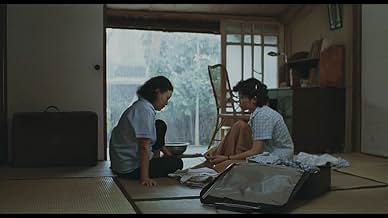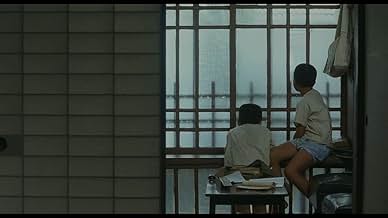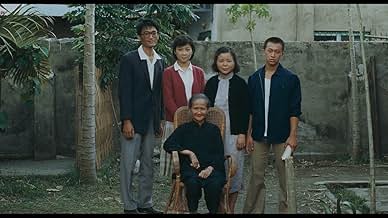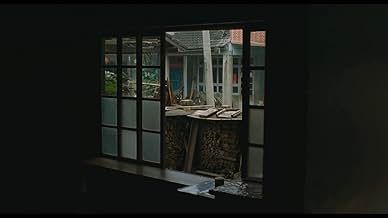IMDb RATING
7.5/10
3.8K
YOUR RATING
The semi-autobiographical film on director Hou Hsiao-Hsien's childhood and adolescence, when he was growing up in Taiwan, living through the deaths of his father, mother and grandmother.The semi-autobiographical film on director Hou Hsiao-Hsien's childhood and adolescence, when he was growing up in Taiwan, living through the deaths of his father, mother and grandmother.The semi-autobiographical film on director Hou Hsiao-Hsien's childhood and adolescence, when he was growing up in Taiwan, living through the deaths of his father, mother and grandmother.
- Awards
- 8 wins & 5 nominations total
- Director
- Writers
- All cast & crew
- Production, box office & more at IMDbPro
Featured reviews
The Taiwanese movie Tong nien wang shi was shown in the U.S. with the title A Time to Live, a Time to Die (1985). The movie was co-written and directed by Hsiao-hsien Hou, and is said to be semi-autobiographical.
The film is a coming of age story of Ah-Ha, whom we meet as a boy of about seven, and whose life we follow until his late teen years. Ah-Ha's family fled China in 1947, and now live in Taiwan. At first, there was still talk about recapturing the mainland, although those discussions faded away as the reality became clear. Still, Ah-Ha's grandmother is convinced that she can walk back to the mainland, and frequently asks people to help her to get there.
If the movie does, indeed, contain autobiographical elements, Hsiao-hsien Hou had a difficult boyhood. His family was poor, and Illness stalked them. As a teenager, Ah-Ha joins a gang that is extraordinarily violent. (The violence takes place off screen, but it is an ever-present plot element in the second half of the film.)
The plot doesn't give us too many heart-rending moments, but it's still very grim. In fact, as I thought back about it, there was only one truly positive scene when—to Ah-Ha's astonishment--his grandmother is able to juggle three guavas. Imagine a movie that is more than two hours long, and has only about 30 seconds of true happiness in it.
It's hard to recommend a movie like this, but, on the positive side, the camera work is brilliant, the acting is excellent, and the film gives us a glimpse of what life was like for a Chinese subculture—people from the mainland who migrated to Taiwan.
We saw this movie at the excellent Dryden Theatre at Eastman House in Rochester, NY as part of a Hsiao-hsien Hou retrospective. It will work well on DVD.
The film is a coming of age story of Ah-Ha, whom we meet as a boy of about seven, and whose life we follow until his late teen years. Ah-Ha's family fled China in 1947, and now live in Taiwan. At first, there was still talk about recapturing the mainland, although those discussions faded away as the reality became clear. Still, Ah-Ha's grandmother is convinced that she can walk back to the mainland, and frequently asks people to help her to get there.
If the movie does, indeed, contain autobiographical elements, Hsiao-hsien Hou had a difficult boyhood. His family was poor, and Illness stalked them. As a teenager, Ah-Ha joins a gang that is extraordinarily violent. (The violence takes place off screen, but it is an ever-present plot element in the second half of the film.)
The plot doesn't give us too many heart-rending moments, but it's still very grim. In fact, as I thought back about it, there was only one truly positive scene when—to Ah-Ha's astonishment--his grandmother is able to juggle three guavas. Imagine a movie that is more than two hours long, and has only about 30 seconds of true happiness in it.
It's hard to recommend a movie like this, but, on the positive side, the camera work is brilliant, the acting is excellent, and the film gives us a glimpse of what life was like for a Chinese subculture—people from the mainland who migrated to Taiwan.
We saw this movie at the excellent Dryden Theatre at Eastman House in Rochester, NY as part of a Hsiao-hsien Hou retrospective. It will work well on DVD.
Although I think The Puppetmaster is the real best masterpiece of Hao, Time to live and the time to die is the one I love most. Despite the implication and background of Taiwan history in the film, as I am not so clear about it and not close to me, the story about growing-up is the reason that the film move me so much. The trip of the main kid "ar Ha" and his grandma become the warmest and most unforgettable part of the film. By the way, I think the relatively slow and quiet style of Hao extremely suit the story of rural and history background, much better than modern city background.
Very good movie in every aspect: acting, performance, cutting, quality of images, and plot. This is based on the true memories of the life of the director growing up in Taiwan. We follow this evolution in this movie in such realistic and natural images and scenes that we forget we are watching a movie and it looks like if we were watching real life scenes through someone's window. The main plot tells the story of a young boy who is dealing with family and other issues as he grows up during a certain period in Taiwan's history. A fascinating movie. Good foreign arthouse movies are so underrated on imdb and I don't even know why. I guess this site is for popular movies only and top 250 is ridiculous.
For me, this transparent, transcendental film ranks with with the very best of Bresson and Ozu. Meandering, episodic and deceptively detached in tone, A TIME TO LIVE AND A TIME TO DIE is quite probably Hou Hsiao-Hsien's most daring formal experiment, as well as--surprisingly--his most moving film to date.
It's kinda weird and almost become universal, many of the screenplay writers and directors in Asian Pacific area, such as Taiwan, China, Japan, Korea, Thailand, Vietnam...seemed to never be able to grow out of their teenage syndrome and phobia of their young and immature romances and loves. The formulaic trend, if I tried to trace it back, most likely was from Japan, originally from their Manga, their anti-social young writers who never had the working experiences or social lives, stayed in their bedrooms, read animated Manga stories, then wrote about their own limited experience from their elementary school to their high school, retrospected their puppy loves to their classmates, boys or girls in their uniforms, timid, shy and reserved, didn't know how to express their love to their opposite gender.
Ho is just one of them, so typically unable to grow out of such remembrance of his teenage love loss and his inability to deal with those impotent situations again and again. It changed and narrowed his thinking, lifestyle and sexuality. His movies most were nostalgic to his teenage time, about the young and fruitless romances, the melancholy regrets, the failures of his romantic adventures in a tightly conservative society he grew up with. His and many other similar Taiwanese writers and directors are exactly like those Japanese and Korean counterparts, many of their products are about romances in uniforms and satchels, after-school encounters, or shyness during classes to each other. These kind of romances never lost their charm to their audiences in puberty, never failed in box office. But it narrowed and hurt their advances in literature and movie production since they couldn't and even refused to grow out it.
It's time for you guys to grow up, not just to grow out of it!
Ho is just one of them, so typically unable to grow out of such remembrance of his teenage love loss and his inability to deal with those impotent situations again and again. It changed and narrowed his thinking, lifestyle and sexuality. His movies most were nostalgic to his teenage time, about the young and fruitless romances, the melancholy regrets, the failures of his romantic adventures in a tightly conservative society he grew up with. His and many other similar Taiwanese writers and directors are exactly like those Japanese and Korean counterparts, many of their products are about romances in uniforms and satchels, after-school encounters, or shyness during classes to each other. These kind of romances never lost their charm to their audiences in puberty, never failed in box office. But it narrowed and hurt their advances in literature and movie production since they couldn't and even refused to grow out it.
It's time for you guys to grow up, not just to grow out of it!
Did you know
- TriviaThis film is inspired by screenwriter-turned-director Hou Hsiao-Hsien's coming-of-age story. It is the second installment of Hou Hsiao-Hsien's "Coming-of-Age Trilogy" that features three prominent Taiwanese screenwriters' coming-of-age stories - the other two are Un été chez grand-père (1984) (inspired by the childhood memories of Chu Tien-Wen) and Poussières dans le vent (1986) (inspired by the coming-of-age story of Wu Nien-Jen).
- ConnectionsFeatured in When Cinema Reflects the Times: Hou Hsiao-Hsien and Edward Yang (1993)
- How long is A Time to Live and a Time to Die?Powered by Alexa
Details
- Release date
- Country of origin
- Official site
- Languages
- Also known as
- A Time to Live and a Time to Die
- Filming locations
- Production companies
- See more company credits at IMDbPro
Contribute to this page
Suggest an edit or add missing content
























